Cinema 4D Pricing Options
Investing in Cinema 4D is a strategic decision for any creative professional or studio. However, determining the most cost-effective path requires analyzing your needs and workflow. Explore the details of each pricing option and identify the best fit for your organization's needs.
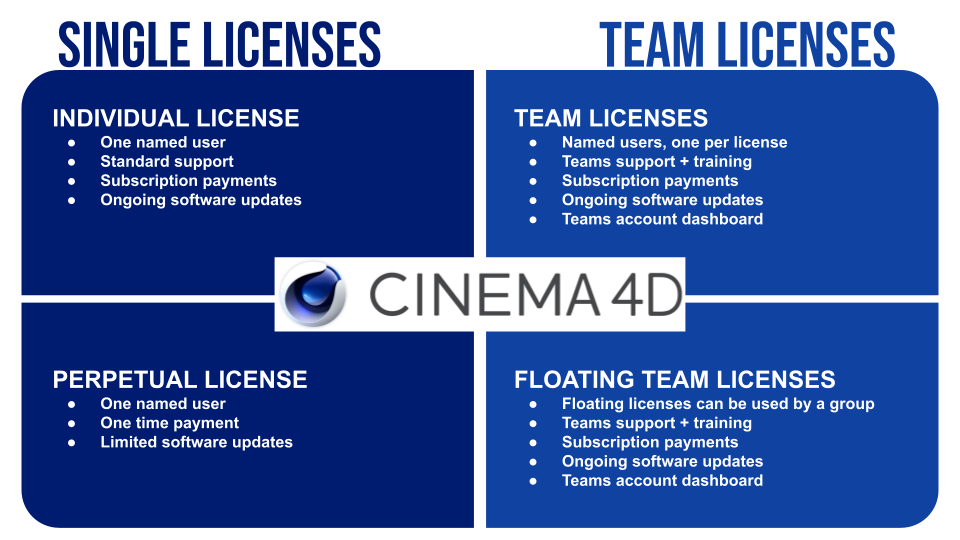
Cinema 4D Pricing for Individuals and Small Studios includes
INDIVIDUAL LICENSES + PERPETUAL LICENSES

INDIVIDUAL LICENSES
This is a subscription-based plan where an individual or studio can purchase one or more licenses. These licenses are under one named user, and cannot be shared among multiple artists. The subscription option is great for budgeting purposes with a predictable annual amount. The software with the individual subscription license is always current so you have access to the latest features and bug fixes. With Cinema 4D subscription you will also receive standard software support.
Companies that prioritize flexibility, affordability, and access to the latest features might thrive with a Cinema 4D subscription model. Ideal candidates might be...
- Small design agencies: Studios with occasional 3D needs for product visualization or branding projects can benefit from the affordability and scalability of subscriptions.
- Freelancers with diverse workloads: Freelancers working on varied projects may not require the full power of Cinema 4D all the time and can opt for flexible subscription tiers.
- Startups with limited budgets: New companies with tight budgets can utilize subscriptions to access Cinema 4D without a hefty upfront investment.
- Studios reliant on cutting-edge features: Studios working on projects requiring the latest 3D technology and tools will appreciate the constant updates and access to new features with subscriptions.
- Teams with fluctuating demands: Studios with project volumes that ebb and flow can easily adjust their subscription tiers to match their current needs.
- Companies prioritizing accessibility: Organizations with multiple remote workers or fluctuating team sizes can benefit from the ease of access and scalability of subscriptions.
- Individuals utilizing Redshift or ZBrush: Companies heavily reliant on Redshift rendering or ZBrush sculpting included in Maxon One subscriptions can enjoy a cost-effective package.
- Studios with collaborative workflows: Teams relying on cloud-based rendering or asset libraries offered with some subscriptions can streamline collaborative tasks.
- Companies open to trial-and-error: Studios experimenting with different 3D workflows or testing their Cinema 4D integration can utilize trial periods and flexible subscription options before committing to a full-fledged license.
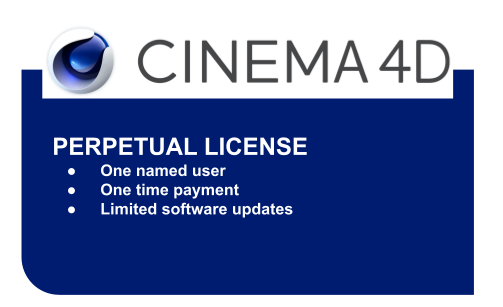
PERPETUAL LICENSES
The perpetual license is the chance to purchase the software for a specific user. These licenses are under one named user, and cannot be shared among multiple artists. The perpetual license is great for studios that don't need the latest updates, and are looking to invest their money up front, but avoid yearly payments.
Several types of companies would benefit from a perpetual license of Cinema 4D:
- Animation studios: If your studio produces high-volume animation projects for TV, film, commercials, or video games, the perpetual license might be more cost-effective than recurring subscriptions.
- Motion graphics studios: Companies that create motion graphics for ads, explainer videos, or social media content can benefit from the long-term savings and ownership advantages of a perpetual license.
- VFX studios: Studios that use Cinema 4D for visual effects in films, commercials, or TV shows can justify the upfront cost of a perpetual license with their high utilization rate.
- 3D design agencies: Agencies that specialize in 3D product design, architectural visualization, or character design can benefit from the flexibility and ownership of a perpetual license.
- Freelancers and solopreneurs: Freelancers who rely heavily on Cinema 4D for their income can find the upfront cost of a perpetual license more economical than long-term subscriptions.
- Companies with strict software licensing policies: Organizations with strict IT policies that restrict recurring subscriptions might find a perpetual license a more compliant option.
- Studios with specialized pipelines: Studios with custom workflows or plugins built around specific Cinema 4D versions might benefit from the version stability and ownership of a perpetual license.
- Companies with offline rendering needs: Companies that rely on offline rendering for security or performance reasons might prefer the flexibility of a perpetual license without ongoing subscription fees.
- Companies with long-term project timelines: Studios working on long-term projects with a predictable timeline might find a perpetual license a better fit than subscriptions with potential price changes or renewal complications.
Cinema 4D Pricing for Teams and Larger Studios includes
TEAM LICENSES + FLOATING TEAM LICENSES
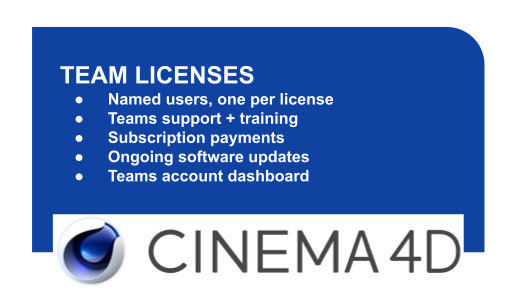
TEAM LICENSES
A team license for Cinema 4D is a special type of subscription offered by Maxon aimed at studios and larger teams. It bundles several advantages compared to individual licenses, making it a budget-friendly and efficient solution for collaborating artists. Here's a breakdown of the key features:
Cost-Effective:
- Per-seat pricing significantly reduces costs compared to buying individual licenses, especially for larger teams.
- Centralized management of licenses simplifies budgeting and streamlines subscription renewals.
Enhanced Collaboration:
- All team members have access to the latest software versions and updates.
- Shared resources like plugins and assets foster knowledge exchange and collaborative workflows.
- Dedicated Teams Account Dashboard facilitates license management and communication.
Premium Support:
- Teams receive dedicated support with faster response times and technical expertise tailored to their needs.
- Access to onboarding and workflow guidance ensures smooth implementation and optimizes utilization.
Types of Team Licenses:
- Named User License: Each team member is assigned a specific license. Ideal for studios with consistent teams and predictable workloads.
- Floating License: A pool of licenses can be shared across a designated user group. Perfect for studios with fluctuating team sizes or remote workforces, as it adapts to changing project demands.
Who Benefits from Team Licenses:
- Studios with growing teams
- Companies with collaborative working environments
- Organizations working on high-volume projects
- Studios with budget constraints looking for cost-effective licensing
- Remote or freelance teams needing flexible license options
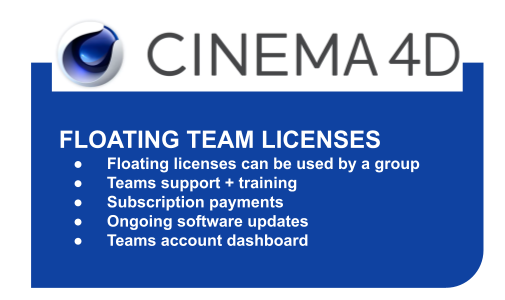
FLOATING TEAM LICENSES
A floating team license for Cinema 4D is a special type of subscription designed for studios and teams with dynamic project demands or fluctuating staff size. It offers a pool of licenses that can be shared across a designated group of users, ensuring maximum license utilization and avoiding unused subscriptions.
How it works:
- You purchase a set number of licenses (think of it like a pool of seats).
- This pool can be shared across any combination of users within your designated group, as long as the total number of active users at any given time doesn't exceed the number of licenses.
- When a user opens Cinema 4D, they "check out" a license from the pool. When they close the software, the license returns to the pool and becomes available for another user.
Benefits of floating team licenses:
- Cost-effective: Ideal for teams with fluctuating workloads or remote workforces, as it avoids wasting unused licenses during less busy periods.
- Flexibility: Adapts to your changing needs, allowing you to scale up or down as projects and team size fluctuate.
- Maximize utilization: Ensures licenses are used to their full potential, eliminating the expense of individual licenses that might sit idle for some users.
- Streamlined management: Simplifies license management compared to assigning individual licenses, making it easier to track usage and maintain compliance.
Who benefits from floating team licenses:
- Studios with projects of varying sizes and durations
- Organizations with remote or freelance teams
- Companies with fluctuating staff size due to seasonal work or project-based contracts
- Studios prioritizing cost-effectiveness and license flexibility
Things to consider:
- Minimum seat count: Most floating license options require a minimum number of licenses purchased initially.
- RLM server management: For offline use, additional fees and RLM server management might be required.
- Communication and tracking: It's essential to have clear communication and usage tracking systems within your team to ensure efficient license sharing and avoid overuse.
To get the most accurate and updated information on Cinema 4D pricing options, contact the Motion Media team. We can provide detailed information on the latest offerings, promotions, and any changes to the pricing structure. Our team at Motion Media can help you decide which pricing option would best fit your company. Contact us today!
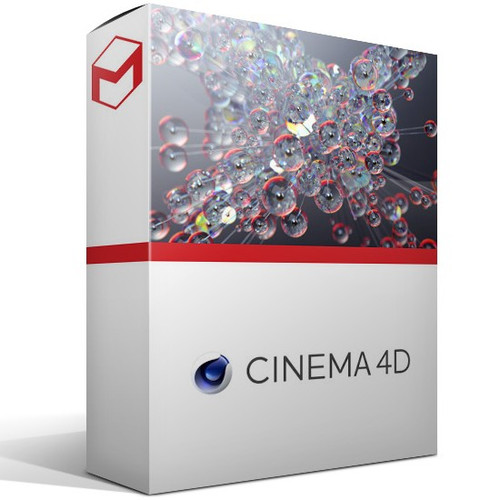
Click here for current Cinema 4D Pricing






